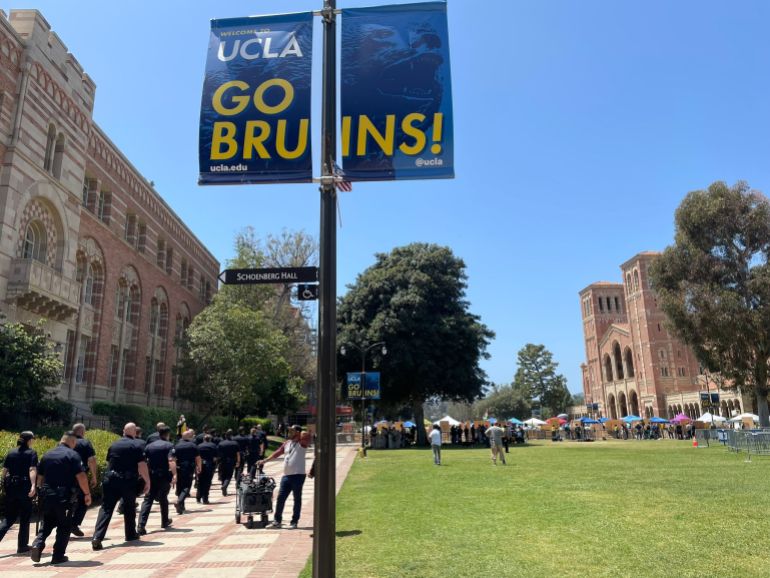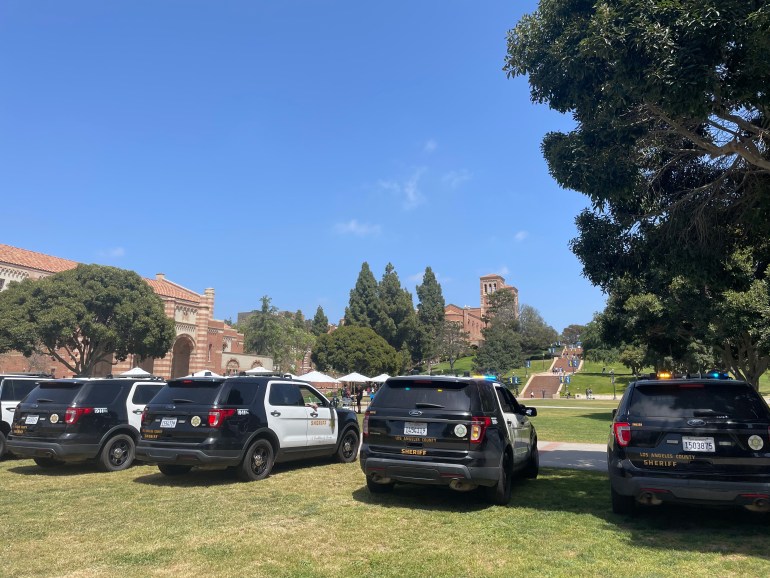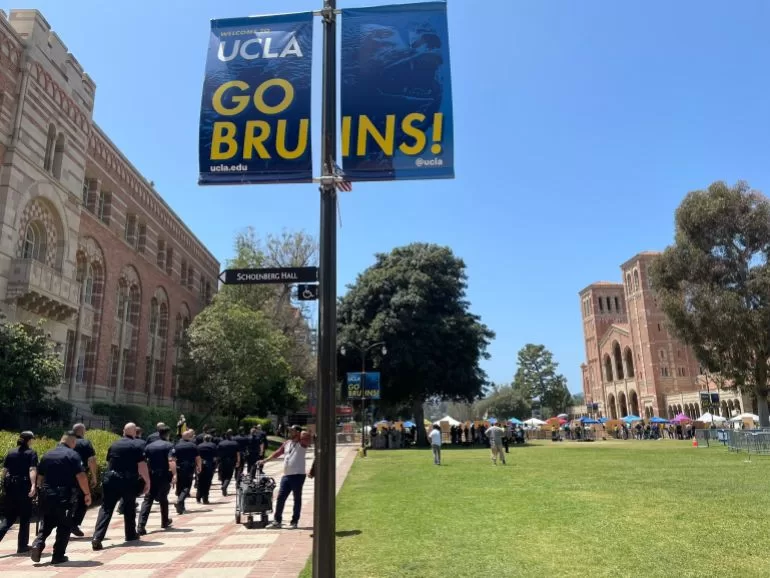Those wishing to enter formed a queue, and organisers instructed them on the ground rules: Don’t engage with police or journalists. Ignore the counter-protesters. Don’t litter. No smoking or drinking.
But despite the relative calm, tensions were high. Just hours earlier, during the night, a group of pro-Israel counter-protesters had attacked the encampment, tearing down barricades and assaulting protesters with metal pipes, mace and pepper spray. Fireworks were also fired into the encampment.
Classes at UCLA were cancelled on Wednesday, and the administration released a statement condemning the “horrific acts of violence” against the encampment, which was erected in protest of Israel’s war in Gaza.
Anna, a spokesperson for the encampment who declined to offer her last name, said dozens of pro-Palestine protesters were injured or pepper-sprayed in the attack, which lasted from late Tuesday night into the early hours of Wednesday morning.
She added that the attack partly took place under the gaze of police, who stepped in several hours after the violence began.
“The police did nothing,” she told Al Jazeera on Wednesday, noting that she still felt the lingering effects of being pepper-sprayed and punched by an attacker from the pro-Israel contingent. She explained she had spent hours assisting others who had been hurt.
“They were coming at us with metal pipes. Numerous people went to the hospital because of how badly they were injured. One person left in a wheelchair. Another had their hand completely smashed.”
By daylight on Wednesday, the space previously used by pro-Israel protesters was largely empty, with several large Israeli flags fluttering in the breeze. Reports of an increased police presence, however, led to suspicions that the pro-Palestinian encampment would be cleared later in the day.

UCLA police and CSC Los Angeles, a security and event management company employed on campus, did not respond to questions from Al Jazeera by the time of publication.
Anna sees a contrast between the apathetic police response to last night’s violence and the way law enforcement has aggressively dismantled pro-Palestinian protests on campuses across the country.
In New York City, for instance, an estimated 282 protesters were arrested overnight as police cleared demonstrations at Columbia University and City College of New York.
As of Wednesday, there was a large police presence on the campus at UCLA, with about a dozen patrol cars facing the direction of the encampment.
Still, it was a sleepy scene: Demonstrators quietly listened to speeches, while officers were observed checking their phones. The occasional heckler dropped by, but they were largely ignored.
Anna told Al Jazeera that Tuesday night’s attack, though, was the culmination of several days of harassment.
Aggression from pro-Israel counter-protesters, she said, had grown with “increasing severity”. There had even been an effort one night prior to break into the encampment.
Anna said the counter-protesters also set up speakers at night to play a handful of songs over and over, in an apparent effort to deprive the demonstrators of sleep and disrupt their peace of mind. She likened their methods to those employed against Palestinian prisoners by Israeli forces.
But she emphasised the students in the encampment do not want the violence to detract from their message.
They prefer to keep the focus on Israel’s war in Gaza, which has killed more than 34,000 Palestinians, most of them women and children, and displaced more than 90 percent of the enclave’s population.
Despite reports of rights abuses from Israeli forces, the US government has remained steadfast in its support of Israel’s military offensive.
Campus protesters like those at UCLA are demanding an end to university investments in companies seen to be complicit in Israel’s war and its occupation of Palestinian territories. They have also called for the termination of university relationships with Israeli institutions.
“Even though we faced this incredible violence last night, this isn’t about us as students,” Anna said. “This is about how we as students can bring attention to the plight of the Palestinians and to the genocide in Gaza. What has brought so many people to this camp is our love for Palestine, for the life and dignity of freedom of Palestinians.”
Political pressure
The attack on the encampment is one of the most violent manifestations yet of the rising tensions on college campuses across the United States.
Students from coast to coast have erected encampments, occupied buildings and carried out other acts of civil disobedience in opposition to US support for the war.
However, university administrators and elected officials, including President Joe Biden, have alleged the protests include instances of anti-Semitism, thereby creating an unsafe learning environment for Jewish students.
Protest organisers at UCLA and elsewhere reject that allegation, though. Jewish, Arab and Muslim communities have all reported upticks in harassment and discrimination since the war in Gaza began nearly seven months ago, on October 7.
Still, since December, two congressional hearings have been held to review the allegations of anti-Semitism on campus, with the presidents of four top universities called in for questioning. Two of those presidents have since resigned.
On Wednesday, the House of Representatives took further action to crack down on anti-Semitism on campus.
It passed a bill to adopt a definition of anti-Semitism into civil rights law that could potentially penalise criticism of Israel. While the bill has yet to be voted on in the Senate, critics fear any resulting law could be used to withhold funds from universities involved with pro-Palestinian activism.
Facing pressure from lawmakers to crack down on the protests, many universities have called in police to disperse the protesters, including at Columbia and Yale, two prestigious Ivy League institutions.

Nevertheless, after the overnight attack at UCLA, Los Angeles Mayor Karen Bass released a statement on Wednesday condemning the “detestable violence” and calling for an independent investigation.
California Governor Gavin Newsom also released a statement saying that those who engaged in illegal action “must be held accountable”, without specifying that pro-Palestine demonstrators were the group that came under attack.
Still, Anna urged politicians to do more to support the UCLA protesters and protect their rights to free speech.
“Overwhelmingly the support is from other students, community members and loved ones,” said Anna. “So far, I have not seen any high-profile politicians condemn how we were assaulted last night in the same way that they’ve condemned Jewish students feeling unsafe because of anti-Zionist activism on campuses.”
